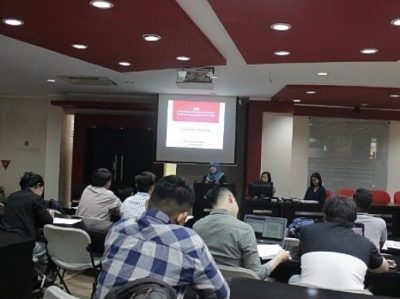Seminar on International Trade Law From the CISG Perspective
The International Law Moot Court Society of the Faculty of Law Universitas Indonesia organized the International Trade Law Seminar from the CISG perspective, on Wednesday 17 October 2018. The seminar was attended by the CEO of PrivyID, Marshall Pribadi, SE, SH as the speaker.
The International Law Moot Court Society the Faculty of Law Universitas Indonesia (“ILMS FHUI”) is a student organization within the Faculty of Law Universitas Indonesia that concentrates on developing international legal research, and moot-court competition in international law commonly referred to as “moot” or “moot-court competition”. ILMS alone has successfully trained and sent students to various moot competitions throughout the world, such as Willem C. Vis International Commercial Arbitration Moot in Austria, Phillip C. Jessup International Moot in the United States, the International Maritime Law Arbitration Moot, the International Humanitarian Law Moot in Hong Kong, Moot Asian Law Students’ Association, and the Asian WTO Moot Court Competition in South Korea. In addition to developing mooting activities, ILMS also aims to facilitate students who want to hone their legal skills.
This seminar aims to provide a deeper introduction to CISG about the scope of its application, and current issues regarding the application of its articles in practice to students.
The CISG (Convention on International Sales of Goods) entered into force on January 1, 1988. It is the result of the United Nations Convention concerning Contracts for the International Sale of Goods which have been ratified by 70 (seventy) countries since 30 (thirty) years of this convention written. In comparison, the New York Convention on Recognition and Enforcement of Foreign Arbitration Awards has only been ratified by 66 (sixty six) countries since 1958.
As of 30 (thirty) years after the conference, CISG has been a tremendous success in the world of legal publishing, with very complete material. The CISG website lists 8,000 articles, books in 28 (twenty eight) languages, and also 1,900 references to court decisions and arbitral tribunals. Although some parties feel that the CISG has not fully promised uniform law for international goods trade, one of them is because there is no high court to provide a uniform interpretation of the text.
Apart from that, the CISG is still not sufficiently taught in depth at the law school because of the constraints on the curriculum in all countries. So one of the efforts to overcome this was by organizing the Willem C. Vis International Commercial Arbitration Moot competition. More than 7,000 law students have participated in this competition year after year. Almost all of them experienced the CISG for the first time in the Moot competition. Even though the CISG in all corners of the world has ratified the CISG, Indonesia is not one of them. Therefore, through the presentation at this seminar, socialization of the importance of the CISG can be conveyed to FHUI law students on how the CISG functions through problem analysis, and its relationship with legal cases and academic writing.

